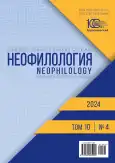“Death in Moscow” by Yuz Aleshkovsky: mortal images, narrative strategy, genre-thematic features
- Authors: Maksinyaev R.I.1
-
Affiliations:
- Ogarev Mordovia State University
- Issue: Vol 10, No 4 (2024)
- Pages: 920-931
- Section: RUSSIAN LITERATURE AND LITERATURE OF PEOPLES OF RUSSIAN FEDERATION
- URL: https://journal-vniispk.ru/2587-6953/article/view/295631
- DOI: https://doi.org/10.20310/2587-6953-2024-10-4-920-931
- ID: 295631
Cite item
Full Text
Abstract
INTRODUCTION. The research is devoted to the study of genre-thematic and narrative peculiarities of Yuz Aleshkovsky’s story “Death in Moscow”. The purpose of the work is to reveal the specifics of thanatological discourse and discourse of political and ethnic anecdote, which form a peculiar poetics and aesthetics of fantastic and mystical narrative.MATERIALS AND METHODS. The material of the study is the little-studied Yuz Aleshkovsky’s novella “Death in Moscow” (1985). The key method is the method of holistic analysis of the artwork, and we also used the motive and narrative approaches.RESULTS AND DISCUSSION. It is established that the central plot episodes of the story perform a carnival function, while the artistic methods determine the author’s strategy. At the narrative level, it is embodied in the interchangeability and identity of thirdperson and first-person narration as a minuscule technique and the alleged “removal” of the author’s mask in the use of stream-of-consciousness techniques. At the plot level, these are inserted anecdotes and short stories that satirically depict images of Soviet power, motifs of death, antipochevanism, and cosmopolitanism.CONCLUSION. In Yuz Aleshkovsky’s story, the technique of reducing the images of Soviet power to the realm of material and corporeal bottom becomes not only a leading technique, but also acquires a ritual sacredness: on the one hand, the writer restores the balance of mythological and everyday life, public and private, near and far. On the other hand, in opposition to the official mythology, he creates his own mythology – the mythology of the folk anecdote, a novel-anecdote, devoted to the laughing comprehension of the death of the dying and dying Soviet state.
About the authors
R. I. Maksinyaev
Ogarev Mordovia State University
Author for correspondence.
Email: maksinyaev.rischat@yandex.ru
ORCID iD: 0009-0005-8304-7764
Post-Graduate Student, Russian and Foreign Literature Department
68 Bolshevistskaya St., Saransk, 430005, Russian FederationReferences
- Kublanovskii Yu. The execution of Lev Mekhlis. Kontinent, 1986, no. 49, pp. 393-396. (In Russ.)
- Kopper J. Mythopoetic thinking in Aleshkovsky’s Smert’ v Moskve. YUZ! Chteniya po sluchayu 75-letiya Yuza Aleshkovskogo = YUZ! Readings on the occasion of the 75th anniversary of Yuz Aleshkovsky. Moscow, Tri kva-drata Publ., 2005, pp. 144-162. (In Russ.)
- Rubtsov Yu.V. Stalin’s Alterego. Pages of the Political Biography of L.Z. Mekhlis. Moscow, Zvonnitsa-MG Publ., 1999, 304 p. (In Russ.)
- Nikiforov D.N., Sklyarenko S.F. Visual Aids in Teaching History and Social Studies. Moscow, Prosveshchenie Publ., 1978, 319 p. (In Russ.)
- Osmukhina O.Yu. Russian Literature through the Prism of Identity. Saransk, Ogarev Mordovia State University Publ., 2009, 288 p. (In Russ.) https://elibrary.ru/qxglwv
- Lotman Yu.M. Death as a plot problem. In: Yu.M. Lotman i tartusko-moskovskaya semioticheskaya shkola = Yu.M. Lotman and the Tartu-Moscow Semiotic School. Moscow, Gnozis Publ., 1994, pp. 417-430. (In Russ.)
- Bakhtin M.M. Problems of Dostoevsky’s Creativity/Poetics. Kiev, Next Publ., 1994, 511 p. (In Russ.)
- Shanbai T.K. (compiler). Lev Gumilev: Encyclopedia. Moscow, Khudozhestvennaya literature Publ., 2013, 701 p. (In Russ.)
- Freidenberg O.M. Poetics of Plot and Genre. Moscow, Labirint Publ., 1997, 448 p. (In Russ.)
Supplementary files









